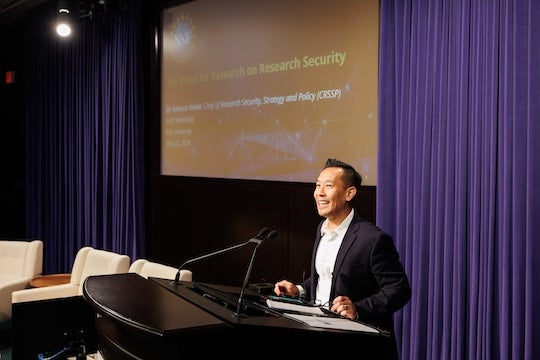Rice University’s Baker Institute for Public Policy hosted a workshop with experts spanning disciplines such as public policy, mathematics, physics, computer sciences, engineering and the social sciences to chart a path forward for the emerging field of research on research security (RoRS).
Supported by the National Science Foundation’s (NSF) Office of the Chief of Research Security Strategy and Policy, the two-part, invitation-only workshop allowed participants to attend a virtual workshop held May 2, followed by the in-person workshop May 23-24 at the Baker Institute.

The first-of-its-kind global workshop, hosted with partners IPTalons, Inc., the University of Houston and the Society of Research Administrators International, brought together global experts from the public and private sectors as well as foreign partners from the European Union, U.K. Research and Innovation, Natural Sciences and Engineering Research Council of Canada, Commonwealth Scientific and Industrial Research Organisation of Australia and Japan Science and Technology Agency. The participants worked to identify the current themes, major issues and challenges to the study of research security and develop a roadmap for the future of the NSF’s RoRS program.
On July 12, 2023, the NSF launched its RoRS program designed to study the field of research security as required in the CHIPS and Science Act and following the federal requirements outlined in the National Security Presidential Memorandum 33 and its accompanying implementation guidelines.
Tam Dao, assistant vice president for research security and leader for the RoRS initiative at Rice and former supervisory special agent of the FBI Houston’s Counterintelligence Task Force, charged the workshop participants to develop testable research questions and hypotheses on research security and to identify research methods and approaches to test such hypotheses.
“The goal of this workshop is to advance the understanding of research security through the application of multidisciplinary scientific approaches,” Dao said.
Research security is not just a problem for the United States, said Ramamoorthy Ramesh, Rice’s executive vice president for research. Ramesh oversees Rice’s internal and external research ventures as he partners with Rice’s senior leadership to bolster the university’s research infrastructure and works to propel productivity and impact to new heights. Ramesh thanked the participants for traveling from across the globe to help tackle the issue of research security collectively.

“Let’s come together, figure out ways by which we can share information to share analytics, share best practices — all to advance the field of research security,” Ramesh said.
The workshop, titled “Responsible Collaboration through Appropriate Research Security,” kicked off with Rebecca Keiser, the NSF’s chief of research security strategy and policy, explaining the past, present and future of research security policy and practice.
“We can’t influence politics, but maybe by providing data and evidence we can influence policy,” Keiser said.
Keiser also has served as head of the Office of International Science and Engineering since coming to the NSF in 2015. The office promotes an integrated, international strategy and manages internally focused programs that are innovative, catalytic and responsive to a broad range of NSF and national interests.
In agreement with Ramesh, she also argued for the need to bring various research communities together for the greater good.
“We have analysis, I think, that touches on research security in many different fields and many different areas,” Keiser said. “And my goal is to bring these communities together and form a community of practice. So again, let’s form this community of practice to focus on developing a new discipline to integrate social science, natural science, economics and other fields to better understand research security and develop a scholarly evidence base to grow the field.”

The workshop asked participants to tackle global research security through topics such as national security, policy and governance, research enterprise and international collaboration.
“We were honored to host such a distinguished group of scholars and administrators at the Baker Institute for two days of productive discussions,” said Kenny Evans, Baker Institute scholar and assistant director for innovation policy at Rice’s Office of Innovation. “Our hope is that the findings from the workshop will inform national discussions on the future of federal research security policy.”
The workshop was led by Rice’s Office of Research Security (ORS) and the Baker Institute Science and Technology Policy Program. ORS recognizes the importance of striking a balance between research security while maintaining an open and collaborative partnership with the international community. The goal of the ORS is to provide resources to the Rice community through awareness, education and training. ORS’s mission is to be a trusted resource to Rice’s leadership, faculty and community of scholars while engaging in constructive conversations with government officials.

